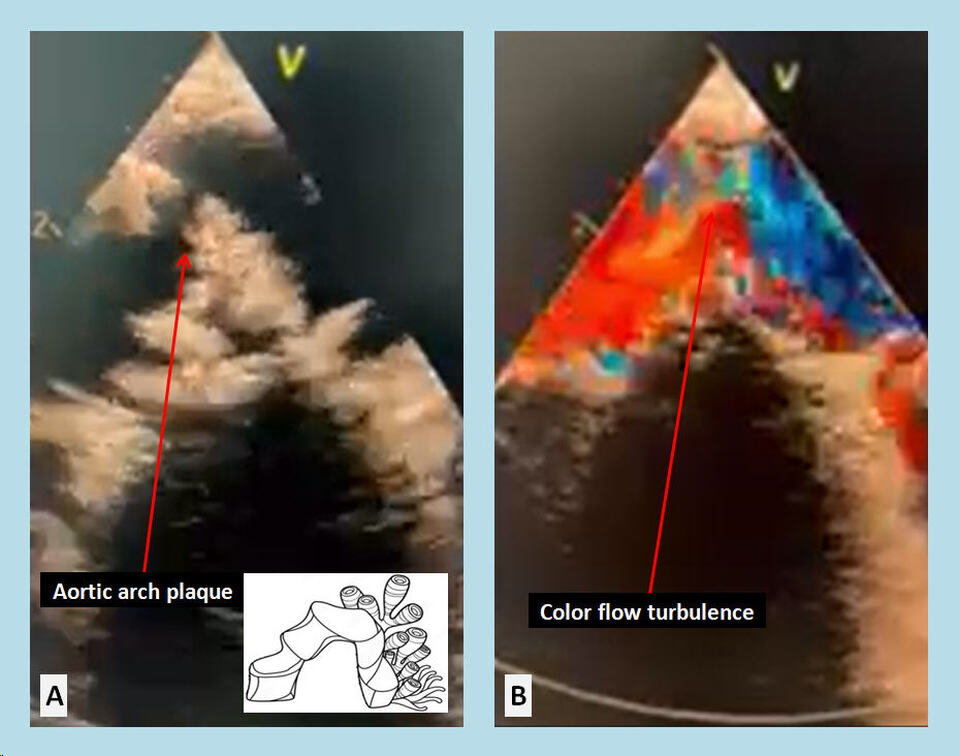September 2023 Issue
ISSN 2689-291X
ISSN 2689-291X
Coral Reef Aortic Arch: Acquired Aortic Coarctation!
Description
The transesophageal echocardiogram (TEE) images above demonstrate giant ulcerated and calcified mobile plaque in the aortic arch (Figure A) simulating a coral reef arch (insert). Figure B demonstrates aliased color flow Doppler across the plaque consistent with flow obstruction. This would cause a physiologic equivalent to aortic coarctation due to the acquired significant aortic arch plaque shown.
Discussion
Aortic plaque burden is a predictor of composite cardiovascular events in cardiac patients, including cardiovascular death, myocardial infarction, stroke, peripheral artery disease, and worsening renal function [6]. The term coral reef aorta has been applied to aortic plaques that is extensively calcified and exophytic in nature [2], originally reported in the segment of the aorta adjacent to the renal artery [3, 4].
In addition to its embolic potential, giant aortic atheroma has been reported to cause obstructive manifestations similar to aortic coarctation [5]. Aortic coral reef has also been reported as a potential cause of heart failure [6].
Treatment options depend on the presentation, disease manifestations and anatomic considerations and may include medical management [7], interventional treatment [8], and endarterectomy or surgery [9]. The rapidly growing endovascular therapeutics, providing novel interventions in face of surgical barriers, could perhaps truly conquer the great coral reef barrier of the aorta in the foreseeable future [10].
References
Mariam Riad, M.D.
Cardiology Fellow
University of South Alabama
Mobile, AL
Nupur Shah, M.D.
Cardiology Fellow
University of South Alabama
Mobile, AL
Mustafeez Ur Rahman, M.D.
Cardiology Fellow
University of South Alabama
Mobile, AL
Rajasekhar Mulyala, M.D.
Cardiology Fellow
University of South Alabama
Mobile, AL
Hassan Tahir, M.D.
Staff Cardiologist
Lake Cumberland Regional Hospital
Somerset, KY
G. Mustafa Awan, M.D.
Professor of Cardiology
University of South Alabama
Mobile, AL
Christopher Malozzi, D.O.
Associate Professor of Cardiology
University of South Alabama
Mobile, AL
Bassam Omar, M.D., Ph.D.
Professor of Cardiology
University of South Alabama
Mobile, AL
The transesophageal echocardiogram (TEE) images above demonstrate giant ulcerated and calcified mobile plaque in the aortic arch (Figure A) simulating a coral reef arch (insert). Figure B demonstrates aliased color flow Doppler across the plaque consistent with flow obstruction. This would cause a physiologic equivalent to aortic coarctation due to the acquired significant aortic arch plaque shown.
Discussion
Aortic plaque burden is a predictor of composite cardiovascular events in cardiac patients, including cardiovascular death, myocardial infarction, stroke, peripheral artery disease, and worsening renal function [6]. The term coral reef aorta has been applied to aortic plaques that is extensively calcified and exophytic in nature [2], originally reported in the segment of the aorta adjacent to the renal artery [3, 4].
In addition to its embolic potential, giant aortic atheroma has been reported to cause obstructive manifestations similar to aortic coarctation [5]. Aortic coral reef has also been reported as a potential cause of heart failure [6].
Treatment options depend on the presentation, disease manifestations and anatomic considerations and may include medical management [7], interventional treatment [8], and endarterectomy or surgery [9]. The rapidly growing endovascular therapeutics, providing novel interventions in face of surgical barriers, could perhaps truly conquer the great coral reef barrier of the aorta in the foreseeable future [10].
References
- Kojima K, Komatsu S, Kakuta T, Fukamachi D, Kimura S, Fujii H, Matsuura M, Dai K, Matsuoka H, Higuchi Y, Ueda Y, Asakura M, Yutani C, Okumura Y, Eikelboom JW, Hirayama A, Kodama K; EAST-NOGA study group. Aortic plaque burden predicts vascular events in patients with cardiovascular disease: The EAST-NOGA study. J Cardiol. 2022 Jan;79(1):144-152.
- Baldaia L, Antunes LF, Silva M, Silva E, Nunes C, Constâncio V, Orelhas L, Fonseca M. Coral Reef Aorta: Literature Review and Analysis of the Published Cases in the Last 20 Years. Ann Vasc Surg. 2024 Jan;98:374-387.
- Kopani K, Liao S, Shaffer K. The Coral Reef Aorta: Diagnosis and Treatment Following CT. Radiol Case Rep. 2016 Oct 4;4(1):209.
- Qvarfordt PG, Reilly LM, Sedwitz MM, Ehrenfeld WK, Stoney RJ. "Coral reef" atherosclerosis of the suprarenal aorta: a unique clinical entity. J Vasc Surg. 1984 Nov;1(6):903-9.
- Lucron H, Sanchez B, Stamatelatou M, Roques F, Tuttle S, Gonneville ALH, Brard M, Cuttone F. Giant Localized Atheroma Mimicking a Coarctation of the Aorta: A Rare Entity to Consider. JACC Case Rep. 2022 May 18;4(10):587-591.
- Berger L, Coffin O, Saplacan V, Pellissier A, Belin A. Aortic coral reef as an unusual possible cause of heart failure. Int J Cardiol. 2014 Dec 20;177(3):e113-4.
- Oey NE, Tulsidas H, Nadarajan K. Medical management of coral reef aorta through optimised diuretic use and angiotensin receptor blockade. BMJ Case Rep. 2021 Jun 2;14(6):e242724.
- Le Bars F, Charbonneau E, Leurent G, Kaladji A. First report of endovascular treatment of symptomatic coral reef aorta in the aortic arch. JTCVS Tech. 2022 Jan 19;12:17-20.
- DeRubertis BG, Jabori SO, Quinones-Baldrich W, Lawrence PF. Retroperitoneal trapdoor endarterectomy for paravisceral "coral-reef" aortic plaque. Vasc Endovascular Surg. 2012 Aug;46(6):487-91.
- Troncone M, Dagenais F. Commentary: Conquering the great barrier: Coral reef aorta. JTCVS Tech. 2022 Feb 21;12:21-22.
Mariam Riad, M.D.
Cardiology Fellow
University of South Alabama
Mobile, AL
Nupur Shah, M.D.
Cardiology Fellow
University of South Alabama
Mobile, AL
Mustafeez Ur Rahman, M.D.
Cardiology Fellow
University of South Alabama
Mobile, AL
Rajasekhar Mulyala, M.D.
Cardiology Fellow
University of South Alabama
Mobile, AL
Hassan Tahir, M.D.
Staff Cardiologist
Lake Cumberland Regional Hospital
Somerset, KY
G. Mustafa Awan, M.D.
Professor of Cardiology
University of South Alabama
Mobile, AL
Christopher Malozzi, D.O.
Associate Professor of Cardiology
University of South Alabama
Mobile, AL
Bassam Omar, M.D., Ph.D.
Professor of Cardiology
University of South Alabama
Mobile, AL

